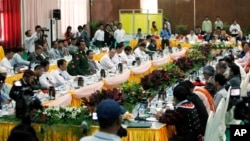Most of Burma's ethnic groups have opened talks with the national government on proposals to reach a countrywide cease-fire deal.
The sides began two days of heated debate Monday in the northern Kachin city of Myitkyina.
The leader of the armed New Mon State Party, Nai Han Thar, said the government delegation was particularly uncomfortable with a call by minority groups for the current military to be replaced with a federal army.
"Regarding our proposal for establishing a federal army, [the government delegation] points out the term and wants us to change it. But it does not mean we are dropping the issue. They accept the fact that the role of the army should be discussed," he said.
But General Myint Soe, a representative of Burma's Defense Ministry, said there were different interpretations of a genuine federal state.
"[The ethnic groups] are now talking about federal union. So, whether their view of a federal union differs from the government's current view and practices is totally up to them," he said.
The U.N. Secretary-General's special advisor on Burma, Vijay Nambiar, said the latest round of talks was significant and hopeful for the whole region.
"It represents a distinct new stage in the development of the national reconciliation. I hope as they move forward, because the real work is in the future, they will be able to provide the same kind of optimism," said Nambiar.
The Burmese government recently announced a tentative plan to have a nationwide cease-fire agreement with all armed groups, followed by an all inclusive political dialogue as early as mid-2014.
Burma's various minority ethnic groups have been fighting against the national government for decades and most have reached unofficial cease-fires with the army in recent years.
This report was produced in collaboration with the VOA Burmese service.
The sides began two days of heated debate Monday in the northern Kachin city of Myitkyina.
The leader of the armed New Mon State Party, Nai Han Thar, said the government delegation was particularly uncomfortable with a call by minority groups for the current military to be replaced with a federal army.
"Regarding our proposal for establishing a federal army, [the government delegation] points out the term and wants us to change it. But it does not mean we are dropping the issue. They accept the fact that the role of the army should be discussed," he said.
But General Myint Soe, a representative of Burma's Defense Ministry, said there were different interpretations of a genuine federal state.
"[The ethnic groups] are now talking about federal union. So, whether their view of a federal union differs from the government's current view and practices is totally up to them," he said.
The U.N. Secretary-General's special advisor on Burma, Vijay Nambiar, said the latest round of talks was significant and hopeful for the whole region.
"It represents a distinct new stage in the development of the national reconciliation. I hope as they move forward, because the real work is in the future, they will be able to provide the same kind of optimism," said Nambiar.
The Burmese government recently announced a tentative plan to have a nationwide cease-fire agreement with all armed groups, followed by an all inclusive political dialogue as early as mid-2014.
Burma's various minority ethnic groups have been fighting against the national government for decades and most have reached unofficial cease-fires with the army in recent years.
This report was produced in collaboration with the VOA Burmese service.





